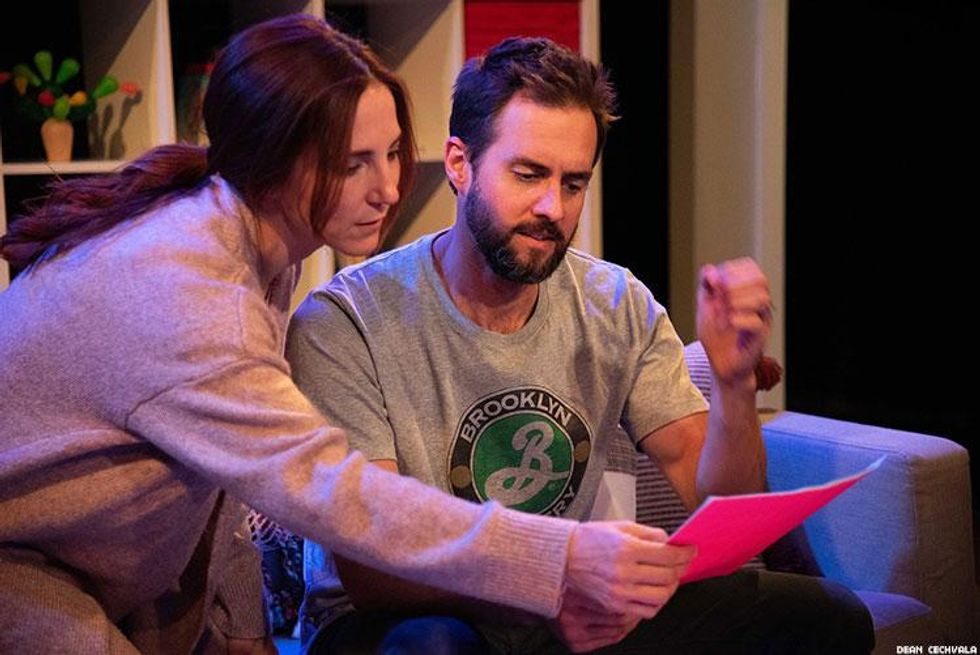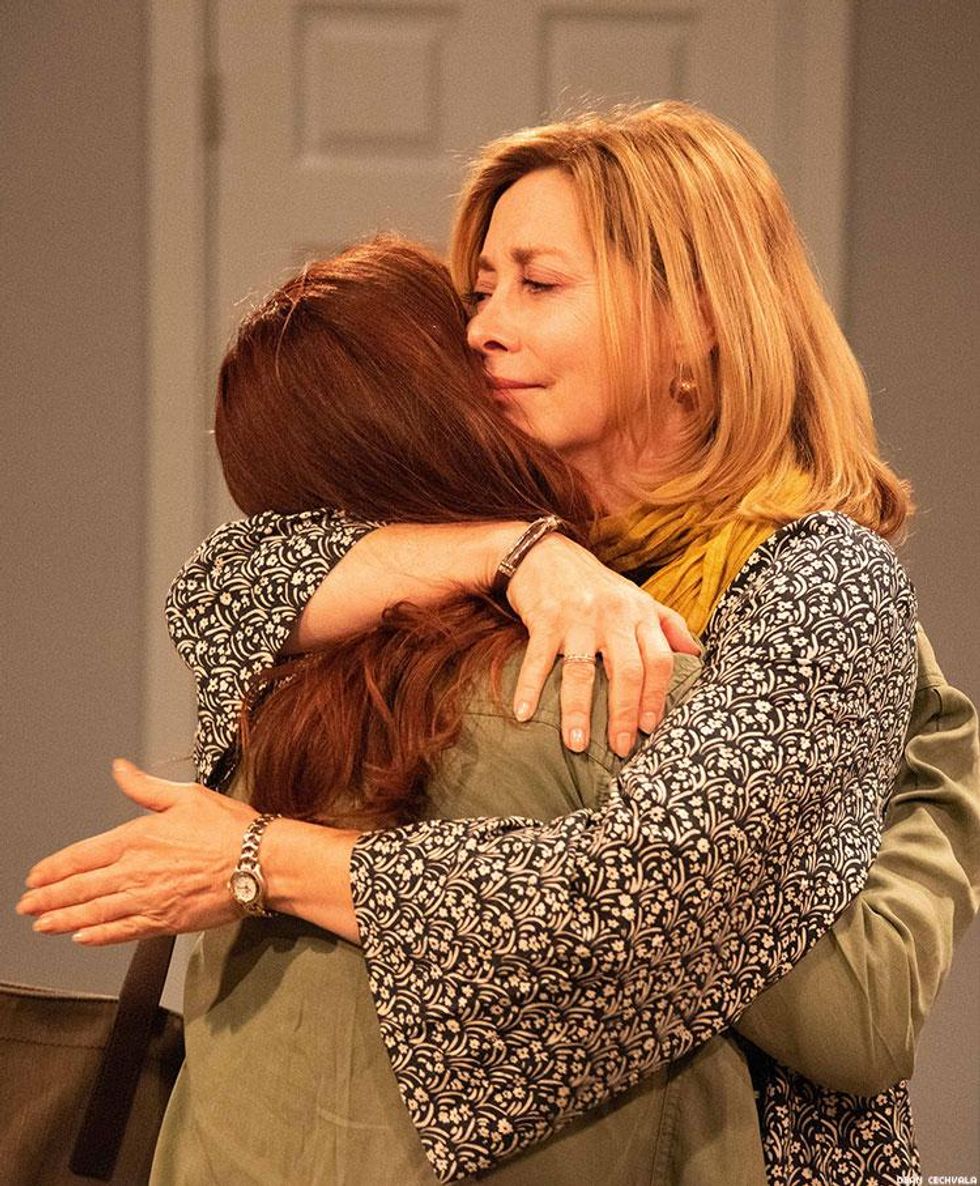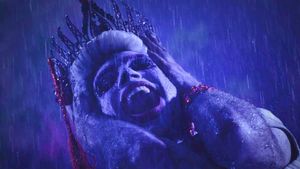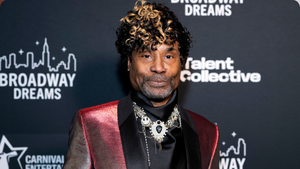When A Kid Like Jake first premiered on off-Broadway in 2013, several milestones in transgender and gender-nonconforming visibility had yet to pass. Laverne Cox was still a year away from appearing on the cover of Time magazine's "transgender tipping point" issue. Amazon's Transparent had yet to premiere. Caitlyn Jenner would not come out until 2015.
Strides in representation and a push for equality were happening so quickly that Jim Parsons feared a film adaptation of the play he was producing would become "less relevant" in the years it took to complete the movie.
Sadly, he was proven mistaken. The story of New York City parents trying to understand their gender-nonconforming child -- in the process of filling out applications to a kindergarten -- became alarmingly relevant as the Trump administration came to power and made rolling back protections for trans students its first act.
A Kid Like Jake, which premiered as a GLAAD-nominated film in 2018, now finds itself back onstage at the Pasadena Playhouse in Southern Califonia directed by Jennifer Chambers and featuring actors Sarah Utterback, Tim Peper, and Sharon Lawrence. And for its playwright, Daniel Pearle, there is a newfound urgency to its story. "We like to believe that things will just get easier and easier and better and better. It doesn't always work that way," he told The Advocate.
Below, Pearle discusses how a play about a 4-year-old kid who prefers playing with "Cinderella to G.I. Joe" changed to adapt to a changing language and cultural landscape -- as well as a movie starring Jim Parsons, Claire Danes, and Octavia Spencer, for which he wrote the screenplay.
And don't miss a special post-show discussion Friday for National Coming Out Day co-hosted by the Los Angeles Gender Center.
The Advocate: What first inspired you to write A Kid Like Jake in 2013?
Pearle: I had been tutoring in New York City at high school level [while in graduate school]. It was a lot of families with kids about to go off to college. It was a lot of parents at this precipice moment getting ready to send their kids off into the world and funnel that anxiety into anything they could control in terms of their college applications. Those family dynamics are always interesting to me. I started realizing, Oh, God, there's a similar thing happening with 4- and 5-year-olds at the kindergarten level, which is hilarious and totally perverse.
At the same time, I'd been reading different articles about gender identity among young kids and how much the conversation was changing. It reminded me of things from my own childhood. I certainly went through a Cinderella phase when I was like 4 and 5, and I was amazed by how much the conversation around all that had changed so much in the past 20 years. It was those two things initially that got me interested in the subject matter. And then it's one of those weird things where you kind of start playing around with characters and it takes on a life of its own.
I started doing research into a lot of child psychology, child development. I don't have kids myself. But I've always been interested in children as vehicles for projection and interpretation. I was really interested in this age, around 4 and 5, when kids start differentiating themselves from their parents. They start keeping secrets and they realize they can lie. It's just a fascinating time, you know? They start really becoming people on their own -- especially when [they] have to go out into the world.
It's kind of crazy because, I wrote that play in 2012, 2013 when it was done first. That was before Transparent, before Caitlyn Jenner, before the whole gender identity questions that really captured the cultural zeitgeist, before everyone was talking about it in a more mainstream way back then. There was plenty to research and read about. But it was interesting to see that become so prominent in our cultural psyche just a few years later.
You said you did research. What kinds?
There were a couple of New York magazine articles and New York Times articles about parents with gender-nonconforming children and the experience and all the practical choices. I also had some friends who are parents and did a lot of asking questions and informal research. I got really interested in reading about neurology at that age, 4 and 5; some of it was psychology, some of it was more developmental psychology.
One fact that jumped out at me was teasing doesn't really start until around kindergarten, usually in preschool. It's not really a thing because labels and categories are much less important to 3-year-olds than they are to 5-year-olds. It has to do with trying to organize the world. So it's not just adults imposing these things. It's also kids themselves, around 4 and 5 and 6, starting to really crave labels and categories so they can make sense of things.
And then there was also the research into the multitude of school options with charter schools and private schools and public schools and gifted schools, if you're a parent looking at your options. It's crazy overwhelming, certainly in New York. But I think it's increasingly that way in a lot of the country -- just the multiplicity of options and choices. Any time you stumble up onto things that are both completely over the top and extreme and also happen to be real, it's great fodder for a play. You don't have to do any exaggerating. It is all there.
What I was really interested in was this idea that every parent wants their kid to be special, but no one really wants their kid to be different. Everyone wants their kid to stand out in certain ways, but they're very scared of them standing out in other ways. There was that tension when it comes to sending your kid out into the world, how that plays out for people who are not repressive or bigoted. I was more interested in how parents with the best of intentions still struggle -- if nothing else, just out of a desire to keep their kids from harm.
 Sarah Utterback and Tim Peper
Sarah Utterback and Tim Peper
Were you ever put in a situation where you were forced to evolve in your understanding of the world and your understanding of identities?
Personally, when I was at that age, 3, 4, 5, I have very vivid memories of when it [felt] totally normal to be interested in "girl stuff," princesses and dress-up. It was around kindergarten when suddenly you have a growing realization that people are looking at it and that it is somehow not OK. In my case, it didn't necessarily come from parents being freaked out or concerned. It was more of a growing realization of the world around you.
That was 1989, a very different time. I grew up in L.A., which is still a pretty liberal, permissive place as far as things go. It's very interesting how that information gets communicated to you when you're that young, because it's not like someone is just telling you, "Oh, you can't do this, you can't do that" -- at least in my case, because I had liberal, open-minded parents. But there are these subtle signals and cues that tell you, "Oh, this is something to be embarrassed about, or this is something to be ashamed about."
It certainly didn't become as big a problem as it does in the play. Because that's the nature of writing; you go to what didn't happen in certain ways. But I was really struck by the pitfalls of language. In the efforts to be more and more inclusive and more and more free-thinking, we ended up creating more and more labels that then themselves become reductive and need to be cast off. There's this perpetual struggle between the language we're using and how we're talking about something that can be both liberating and also limiting.
The fact that there is so much more language [today] is both really helpful but also presents a whole new host of challenges. Because it's a whole new host of choices. It's not something that parents can ignore in the way that they might have 20 years ago. That struck me as really interesting. Fundamentally, the play is really about just how painful intimacy is. Because no matter how much you love someone, there are always elements of another person that are always going to be inaccessible to you and remote.
Especially in New York and L.A. right now, we talk a lot about tolerance. I feel like one of the things we have the hardest time tolerating is any kind of gray area or ambiguity or uncertainty. It would be a very different story if this was about a kid who was 10, 11, 12, who was saying, 'This is who I am. I was born Jake, but I'm a girl.'
I was much more interested in the period where it's more murky and unclear. How do you make decisions as a parent that allow [kids] to be who they are without pushing them in one way or the other prematurely? I've experienced that with plenty of people in my life, when you were struck by how much of your own assumptions are actually projections you have about people. That's certainly not limited to gender. We're all seeing people based on our own baggage and our own life experience and our own projections. That's the fun of drama, getting to play that out.
Why did you prefer Cinderella to G.I. Joe?
I think I liked the costumes better. The costumes were a lot more fun. That's the main thing. Mostly when you're a kid, you gravitate to what you gravitate to. But by comparison, G.I. Joe felt so boring, so much less going on.
Did you have social activism in mind when you penned the play? I know that representation is itself a form of activism, but I'm curious if you were thinking about moving the needle about anything in a certain way.
To be honest, as a writer, that's usually not where I start from. It's more about characters. But I do think once you realize what you've written ... [For example,] I adapted the play for a film and the movie came out in 2018. I was really excited. We were at Sundance, and after the premiere screening, there was a guy in his 60s or 70s. He raised his hand and said, "I really wish this movie had existed when I was that age."
It was by far the most meaningful feedback I ever heard. Because I do feel like you're part of the conversation. I think it's very easy to have very lofty, progressive ideals and ambitions when it's abstract and hypothetical. A lot of those things are much harder when it's in your living room and it's your kid and there are practical concerns. I think we've gotten to a point where, because of the culture -- again, I'm mostly talking about places like New York and L.A. and more liberal cities -- where it has become much more mainstream to be more accepting.
But I do think that often it's easy then to ignore that there are is plenty of anxiety and discomfort. And a lot of that comes from protectiveness about having a kid whose behavior is outside the norm in some way. I guess my hope with the play is just allowing an honest representation of that in a way that doesn't idealize or demonize parents. My hope is always that if you write something that feels authentic and truthful, then hopefully that leads to conversations and more empathy -- both for kids and for parents, frankly, who might be struggling with this issue.
I don't think that was where it started for me, just because as a writer, I've never set out with an agenda in mind. But you hope that your work can have ripple effects. Visibility is huge. And what's so special about theater is that it is this collective, intimate, shared experience where there's a framework in which we can perhaps encourage an audience to tolerate more uncomfortable uncertainty than they might be inclined to do in their own lives.
 Sarah Utterback and Sharon Lawrence
Sarah Utterback and Sharon Lawrence
You've written this story for the stage and also the screen. Do you have a preference in terms of how it's presented or how each might be received differently? Can you talk about the differences?
Obviously, the play came first. It was initially conceived that way. I think the fun of adapting it for screen and also the challenge was opening up the world. In the play, Jake is offstage the whole time. That's a pretty fundamental conceit of the play that, as an audience, we never actually meet Jake. That was very deliberate and intentional, not just because a 4-year-old onstage is a big ask. But also because each of the adults in the play is seeing a slightly different version of that kid. It's so much about their interpretations and projecting.
Some things were much easier on-screen because it's really fun to write scenes to see other aspects of their lives and other characters, parents and friends, characters that were maybe mentioned in the play but actually got put in the movie. I think the big creative challenge was Jake himself.
In a movie, the idea of never seeing the kid, me and the director both felt that it was going to feel awfully contrived and forced in a film where you're seeing so much more of their lives. The big directorial challenge was how we can see Jake in the film without an audience making up their mind and keeping that fundamental elusiveness alive. For all these adults involved -- and it really is about the adults -- he's just out of reach for a lot of them to fully understand and access, and you wanted to keep that.
We wanted to keep that ambiguity alive. That's certainly easier in a play where the audience is actually creating the kid in their own mind. Luckily, I had producers and a director who also understood that this was going to be a film that was still very much about language and they weren't afraid to have long talking scenes. So many of the scenes in the play really hinge on language and a turn of phrase. That's so often the plot, frankly. Someone says something and it changes the tenor of a conversation. I didn't want to lose that. I didn't want to open it up so much that it became something it wasn't.
And then there were certain things I discovered in [the film] that I wanted to put back into the play ... just because time has passed. And for the conversation, there's certain language in the play that we actually updated for the film and I put back into play now just because things keep changing so fast. Suddenly 2013 feels actually like a long time ago.
A lot has changed in the culture. Can you talk a little bit more about the changes that have been made in the play since it premiered in 2013?
A lot of it had to do with the character of Judy, who runs this progressive nursery school and is an expert in child psychology and development. There was certain language that she used in the original play that by 2018 suddenly felt a little dated. Because someone like her would be on the cutting edge of research and thinking, there were some language changes in her scenes. There were also some things about the school systems that have changed in New York. Certain tests have since been abandoned. Certain gifted programs have become even more competitive.
I remember in 2013, the phrase that I saw most was "gender-variant behavior" or "gender-variant play." Recently, "variant" has pejorative connotations. Now people use the term "gender-expansive." That kind of thing. Then there was "gender-nonconforming." So there are these little incremental shifts in the language that, for that character especially, it was not the story that she would be behind the time. Actually, Silas Howard, the director of the film, he consulted with someone from GLAAD for the screenplay just to make sure there was nothing bumping on as far as language that felt dated. We very much wanted to keep it current.
Has the meaning of the play changed for you, especially in the wake of the Trump administration and the attacks it has launched on transgender young people in schools?
I don't think the meaning has changed. I think the stakes feel different. It's funny because when I wrote the play, I was so interested in, OK, let's look at how this plays out in a world where a kid is relatively safe, where you see that these parents are not repressive or overly conservative. It's amazing what's happened since 2016. It's just been a really sad reminder of just how far we have to go and how dangerous it still is and how easily things can swing back in a really scary direction. The story is still the same. I think the stakes feel higher because of the need to protect a kid whose expressions are outside the norm. I think if anyone thought that was becoming less urgent, that's been debunked. It's a reminder of just how important is to interrogate our own biases.
You see how much backlash there can be to progress forward. The play has really always been about the challenges of intimacy, whether that's with your partner or with your child, and learning to grapple with situations over which you have no control. There are all these things in our lives, some small, some really big, that ultimately we have no say in but we can't just ignore because we have to make very concrete decisions.
In the play, [the parents] have no control over who Jake's gonna want to be someday. But that doesn't mean they can just throw up their hands and ignore it. Do you let him dress up like this for Halloween? Do you let him go to school like this? Do you let him do this? There's sort of all of these practical decisions. I feel like that's really where the play lives; it's so much about how you don't try to control what you can't while still living your life.
I remember when we were like in preproduction of the film and Trump's whole ban on transgender members of the military. It was just like, Jesus Christ. We're back here. Really? It is easy to get complacent. Especially when you do live in a city where like L.A. or New York where it's really easy to just forget that these things are still so hard for people. It was funny because Jim Parsons, who optioned the film and then was producing it, I remember him saying at one point, "At first I was afraid that the film was going to become less relevant." But sadly, it's just become even more urgent now than it was two years ago. We like to believe that things will just get easier and easier and better and better. It doesn't always work that way.
What's the message that you hope audience members take away from A Kid Like Jake in 2019, then?
There's such an impulse to try to control things that scare us and to control things that are uncomfortable and to try to make sense of them and make logical sense. Anything that promotes anxiety, you just want to name it and you want to understand it and you want to control it. So I would hope that this [play] encourages people to tolerate -- and not just different identities. But also letting things be without a definitive label -- at least for a period of time -- and to sit in uncertainty, to sit in ambiguity. Trusting that the answers will reveal themselves.
A Kid Like Jake runs September 28 to November 3 at the Pasadena Playhouse in Pasadena, Calif. It is directed by Jennifer Chambers and produced by IAMA Theatre Company. Find tickets at PasadenaPlayhouse.org.


 Sarah Utterback and Tim Peper
Sarah Utterback and Tim Peper Sarah Utterback and Sharon Lawrence
Sarah Utterback and Sharon Lawrence

































































Charlie Kirk DID say stoning gay people was the 'perfect law' — and these other heinous quotes